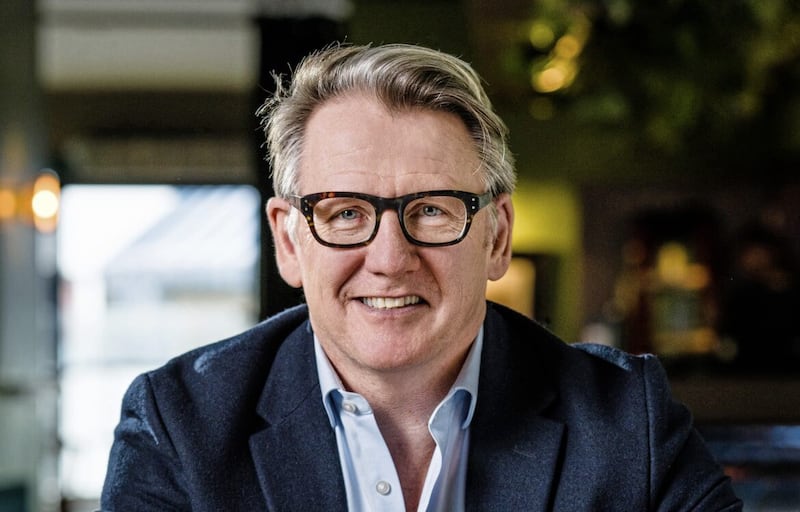Around this time last year, I booked a guided kayak trip from Ballintoy harbour for my wife Elizabeth and I. It was one of the most idyllic afternoons we have ever had. The sun was blazing in the clear blue sky and the sea was flat calm.
Gareth, our instructor, provided a brilliant balance of interesting marine and historical information alongside good instruction on open-top sea kayaking. We paddled east along the coast and navigated the little swell on the eastern side of the rope bridge allowing us to paddle under it, waving to the tourists above. It was our first day on sea kayaks and we felt like professionals already.
For anybody who knows that part of the world, there is nothing quite like the views of Fair Head and Rathlin from Ballycastle and along the coast road. I’ve always loved it there and it’s also the site of one of the renewables projects that has most interested me over the last 25 years.
Where the Irish and Sea and the North Atlantic meet around Rathlin and Torr Head is actually one of the best locations in the world for tidal energy. The confluence of the two bodies of water meeting creates perfect conditions for what are essentially under-water turbines. This isn’t big news, it’s been known about for years and at least two serious projects have been proposed there, along with major offshore wind projects off the south Down coast.
None have come to fruition so far. And we do need them if we are going to come anywhere close to the renewable energy targets set by the Executive. Our Climate Change Act sets a target of net zero emissions by 2050 along with interim targets including an at least 48% reduction in net emissions by 2030.
The Act also sets other sectoral targets including 2030 targets of at least 80% of electricity consumption from renewable sources and 70% of waste is recycled as well as a target for a minimum spend of 10% of overall transport budgets on active travel.
During the year from July 2022 to June 2023, the volume of electricity consumption was 7,420 gigawatt hours and local renewable resources, including wind, biogas, biomass, solar and landfill gas, provided 3,379 GWh of that amount, or just over 45%.
While electricity consumption has fallen by 8.9% over the last 10 years, the amount of renewable electricity we use here fell slightly in the year to June 2023, though total renewable generation has increased by 177.6% in the past decade.
Still, that rate of increase will have to improve if we are to reach the 2030 target. And offshore production is going to be a crucial part of it.
The drive to net zero is supposed to pervade every part of government here but in a recent meeting with a former senior civil servant I was told it is not being taken seriously enough, though some interesting initiatives have emerged like heat pump grants, similar to England and Wales and the socialisation of grid connection charges, which Conor Murphy announced recently.
The net zero target by 2050 was one of Conor Murphy’s four key priorities in his economic strategy and the role of renewable energy solutions will be crucial to achieving this goal.
Obviously, big renewable projects like offshore wind and tidal will be crucial in achieving that goal but innovative domestic and business adoption will also be important and there is a clear business opportunity in that space also.

One such early adopter is that area is Ryan Daly, now of b4b Renewables, who, as founder of Daly Renewables, was named Young Entrepreneur of the Year in 2011 for his design and installation of renewable energy systems which are cheaper in the medium and longer term but also extremely important in helping to reduce carbon emissions.
Ryan is one of a growing band of business people here who are innovating with renewables and, in his case, producing tailored solutions which combine technologies such as heat pumps, solar panels, geo-thermal collector pipes and many more products to service one-off houses, large private and social housing developments and a wide range of business premises.
Now, as part of a group of businesses which include the leader in the EV charging space Weev, it will be very interesting to see where Ryan can take things. Persuading home and business owners to invest in a high quality renewables solution with measurable long term benefits is a big part of the journey we all need to go on if we are to achieve the 2050 target.
Meanwhile Elizabeth was so invigorated by the whole kayaking experience last year, she ordered kayaks of our own on the same afternoon after the rope bridge trip. She’s become so good and confident about it, she’s kayaked over to Rathlin from Ballycastle. Now that’s paddle power for you.
- Paul McErlean is managing director of Cavendish Ireland.







